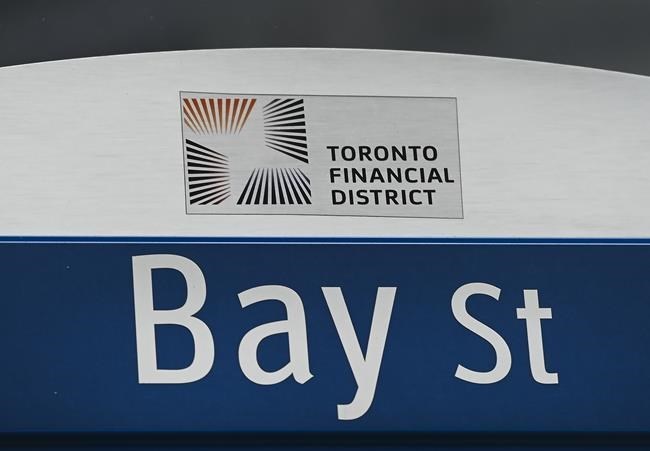TORONTO — The Royal Bank of Canada has replaced Shopify Inc. as the country's most valuable company as the technology sector faded Monday despite a run-up of the S&P/TSX composite index.
Canada's main stock index closed up 76.82 points to 18,457.78 after setting an intraday record high of 18,595.72.
In New York, the Dow Jones industrial average was up 306.14 points at 31,802.44 after also setting a record intraday high, and the S&P 500 index was down 20.59 points at 3,821.35.
The tech-heavy Nasdaq moved into correction territory by falling 10.8 per cent from its recent peak, losing 310.99 points Monday to close at 12,609.16.¬Ý
The technology sector was the biggest laggard on the day as bond yields continued to rise.
The 10-year Canadian bond yield hit a high of 1.538 per cent while the U.S. 10-year treasury rose to as much as 1.61 per cent.
"Rates are increasing for the right reasons," said Angelo Kourkafas, investment strategist at Edward Jones.
The increases are signs of a strong economic recovery that marked a repositioning in equity markets away from growth stocks like technology that have led the way during the downturn.
Unlike the dot-com correction of 2000, however, today's technology companies contain large, profitable companies. Interest rates were increased back then to cool an overheated environment but current rates remain very low.¬Ý
A US$1.9-trillion stimulus package that's expected to pass Congress on Tuesday, along with the COVID-19 vaccine rollout, have buoyed investor sentiment that the economy will recover strongly in the second half of the year.
Shopify's market capitalization has fallen to about $153 billion while Royal Bank has increased to $163 billion to regain the top spot.
The Ottawa-based tech company moved to the top position last May as its share price began a phenomenal run, quadrupling its value. However, the shares have plunged 27.5 per cent since their peak of $1,900.58 on Feb. 10.
They were down 4.6 per cent on Monday, trailing only Lightspeed POS Inc., which fell 7.2 per cent.
The energy sector fell as crude prices were pushed lower after last week's 7.5 per cent gain by signals that OPEC plus Russia may further increase output in May. Shares of Whitecap Resources Inc. and Vermilion Energy Inc. were each down 3.8 per cent.
The April crude contract was down US$1.04 at US$65.05 per barrel and the April natural gas contract was down 3.7 cents at US$2.66 per mmBTU.
Crude prices had initially risen in the morning following drone strikes on Saudi Arabian oil facilities.¬Ý
The Canadian dollar traded for 78.99 cents US compared with 78.94 cents US on Friday.¬Ý
Materials also moved down as lower gold prices pushed Hudbay Minerals Inc. down 4.4 per cent.
The April gold contract was down $20.50 at US$1,678.00 an ounce and the May copper contract was up 1.75 cents at US$4.09 a pound.¬Ý
The repositioning of the stock market moved eight of the 11 major sectors on the TSX up, led by real estate, consumer discretionary and financials.
"We are seeing a rigorous leadership change," Kourkafas said in an interview.
"Despite a 10 per cent correction in the Nasdaq with many tech stocks down even more, major indexes remain resilient as investors have rotated towards cyclical sectors and stocks that stand to benefit from an earlier and stronger economic recovery facilitated by the vaccine rollout."
Restaurant Brands International Inc. climbed 4.2 per cent while Linamar Corp. rose 3.8 per cent to move consumer discretionary up 1.9 per cent.
Higher bond yields help the financials sector, which increased ¬Ýas National Bank and Laurentian Bank increased 2.3 and two per cent, respectively, while shares of the Royal Bank rose 1.7 per cent.
This report by The Canadian Press was first published March 8, 2021.¬Ý
Companies in this story: (TSX:RY, TSX:SHOP, TSX:QSR, TSX:LNR, TSX:WCP, TSX:VET, TSX:NA, TSX:LB, TSX:LSPD, TSX:GSPTSE, TSX:CADUSD=X)¬Ý
Ross Marowits, The Canadian Press




